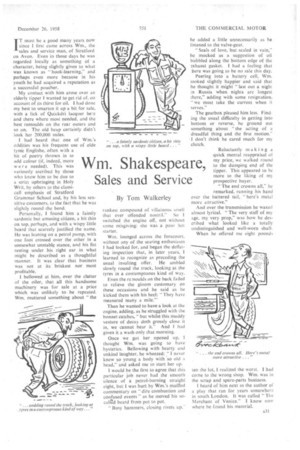Wm. Shakespeare,
Page 33

If you've noticed an error in this article please click here to report it so we can fix it.
Sales and Service
By Tom Walkerley
IT must be a good many years now since I first came across Wm., the sales and service man, of Stratford on Avon. Even in those days he was regarded locally as something of a character, being slightly given to what was known as " book-learning," and perhaps even more because in his youth he had acquired a reputation as a successful poacher.
My contact with him arose over an elderly tipper I wanted to get rid of, on account of its thirst for oil. I had done my best to smarten it up a bit for sale, with a lick of Quickdri lacquer here and there where most needed, and the best remoulds on the rear outers and so on. The old heap certainly didn't look her 200,000 miles.
I had heard that one of Wm.'s oddities was his frequent use of olde tynie Englishe, often with a bit of poetry thrown in to add colour (if, indeed, more were needed). This was variously ascribed by those who knew him to be due to a strict upbringing in Holy Writ, by others to the classicall emphasis of Stratford Grammar School and, by his less sensitive customers, to the fact that he was slightly round .the bend.
Personally, I found him a faintly sardonic but amusing citizen, a bit thin on top, perhaps, and with a wispy little beard that scarcely justified the name. He was leaning on a petrol pump, with one foot crossed over the other in a somewhat unstable stance, and his fist resting under his right ear in what might be described as a thoughtful manner. It was clear that business was not at its briskest nor most profitable.
I bellowed at him, over the clatter of the oiler, that all this handsome machinery was for sale at a price which was unlikely to be repeated. Wm. muttered something about "the
rankest compound of villainous smell that ever offended nostril." So I switched the engine off, not Without some misgiving: she was a poor hot starter.
Wm. lounged across the forecourt, without any of the searing enthusiasm I had looked for, and began the deflating inspection that, in later years, I learned to recognize as preceding the usual insulting offer. He ambled slowly round the truck, looking at the tyres in a contemptuous kind of way.
Even the reTioulds on the back failed to relieve the gloom customary on these occasions and he said as he kicked them with his heel: "They have measured many a mile."
Then he wanted to have a look at the engine, adding, as he struggled with the bonnet catches," but whilst this muddy vesture of decay doth grossly close it in, we cannot hear it." And I had given it a wash only that morning.
Once we got her opened up, I thought Wm. was going to have hysterics. Bellowing with hearty and unkind laughter, he wheezed: I never knew so young a body with so old a head," and asked me to start her up.
I would be the first to agree that this particular job never had the smooth silence of a petrol-burning straight eight, but I was hurt by Wm.'s muffled commentary on "dire combustion and confused events" as he moved his socalle'd beard from pot to pot.
"Busy hammers, closing rivets up.
he added a little unnecessarily as he listened to the valve-gear.
" Seals of love, but sealed in vain," he mocked as a suggestion of oil bubbled along the bottom edge of the exhaust gasket. I had a feeling that 'here was going to be no sale this day.
Peering into a battery cell, Wm.
looked slightly happier and said that he thought it might "last out a night in Russia When nights are longest there," adding with some resignation, "we must take the current when it serves."
The gearbox pleased him less. Find ing the usual difficulty in getting into bottom or reverse, he ground out something about "the acting of a dreadful thing and the first motion." I don't think he cared much for my clutch.
Reluctantly making a quick mental reappraisal of my price, we walked round to the dumping end of the tipper. This appeared to be more to the liking of my prospective buyer.
"The end crowns all," he remarked, running his hand over the battered tail, "here's metal more attractive."
And over the transmission he waxed almost lyrical. "The very staff of my age, my very prop," was how he described what looked like a totally undistinguished and well-worn shaft.
When he offered me eight pounds
ten the lot, I realized the worst. I had come to the wrong shop. Wm. was in the scrap and spare-parts business.
heard of him next as the author of a play that ran for years somewhere in south London. It was called "The Merchant of Venice." I know now where he .found his material.








































































